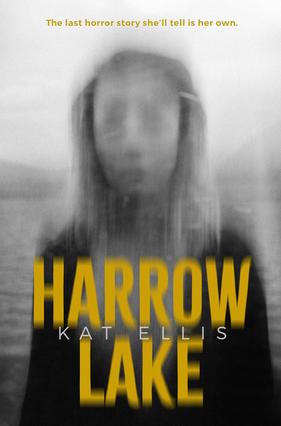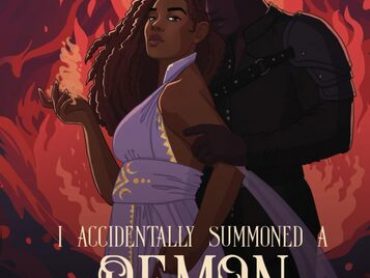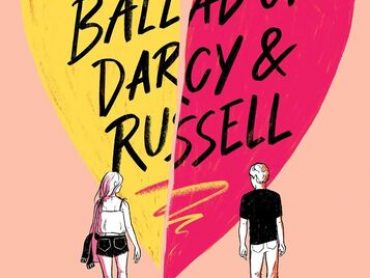YA author Kat Ellis is the author of Harrow Lake, an eerie blend of supernatural horror and psychological thriller. The book has a campiness that scary movie buffs will love, and a mystery that is major Stephen King vibes. Harrow Lake follows Lola Nox, the daughter of a celebrated horror filmmaker. But when her father is brutally attacked, Lola is quickly packed off to live with a grandmother she’s never met in Harrow Lake. The eerie town is where her father’s most iconic horror movie was shot, and it’s full of weird locals, strange disappearances. Will she make it out alive? Kat Ellis spoke with YEM about writing a good horror novel, and took over our Twitter account for a day. Check out her advice, tips, and secrets here!
Young Entertainment Mag: How did you first get involved in writing?
Kat Ellis: I always enjoyed writing from a young age, but it wasn’t until I was around 25 that I decided to try to write a whole novel (I’m 38 now). I’d been reading a lot of YA novels, and it rekindled my love of books — this having been well and truly crushed when I had to read Daniel Deronda in university. It’s over 800 pages! And not one single laugh in the entire book! So, basically YA saved me. My debut was Blackfin Sky which came out in 2014, and my next two were Breaker and Purge, followed by Harrow Lake this year.
YEM: What are some inspirations into the horror genre that got you excited to write about it?
Kat: Growing up, I used to read Point Horror, Christopher Pike, RL Stine – later moving on to Anne Rice’s vampire books, and basically anything by Joe Hill. I’ve always been a huge horror movie fan, too. You can tell that from all the horror movie references there are in Harrow Lake!
And now, there are so many fantastic YA horror novels out there. Some of my recent favourites have been Teeth in the Mist by Dawn Kurtagich, Hold Back the Tide by Melinda Salisbury, Five Midnights by Ann Dávila Cardinal, Good Girls Die First by Kathryn Foxfield, and The Bone Houses by Emily Lloyd-Jones.
YEM: Do you have a favorite horror movie or show? What would you recommend to someone who asked you for a good horror recommendation?
Kat: The Babadook is fantastic, and definitely played a part in inspiring me to write Harrow Lake. I like the cleverness of it — that it explores the idea of what a monster really is, and how some of them you just have to learn to live with.
I also love big sci-fi horror movies like Aliens and Event Horizon and Pitch Black, and TV shows that do interesting things with format, like American Horror Story, The Haunting of Hill House, and Locke & Key.
YEM: You write thrillers as well as horror – are you interested in true crime?
Kat: I am. I think true crime documentaries and books can provide great story ideas, and I’ve always been a touch morbid. I remember when I was around 14, I had to choose a topic for a presentation in class, so I chose the Moors Murders. But I do prefer fiction, whether it’s horror or thriller or something entirely different. True crime gets a bit too… real. I prefer my trauma to be fleeting and fiction-based, thank you.
YEM: Some stories end on a cliffhanger like a mystery of their own. Do you enjoy cliffhangers?
Kat: Not massively, no. Usually there’s a year or more between 2 books in a series being published, so if I read the first one when it comes out and then have to wait ages to find out what comes after the cliffhanger, I’ve usually forgotten half of what happened in the first book. I do like stories which end with a note of mystery, though – where you have enough information that you can draw your own conclusions about what really happened, or who was to blame. I feel like I’m more involved in the story that way.
YEM: What would you recommend to writers who want to be good at writing suspense?
Kat: Read plenty in your genre. Watch it, too – movies, shows, documentaries. I think the key to being able to write something which feels fresh and edgy is knowing what’s already out there, and honing your writing through trial and error. But that applies to any genre, really; for writing something suspenseful, it’s about carefully balancing what you reveal to the reader, and when. Every answer given should lead to another question, and keep the reader turning the pages.
See Kat Ellis take over YEM’s Twitter account here!
Hi! I’m Kat Ellis, author of YA horror-thriller Harrow Lake (and a few other thrillery books) and I’m taking over the YE account for the next 2 hours, MWAHAHA… Questions welcome!#YAauthorTakeover pic.twitter.com/fBKs3hB9mT
— WATCH 📺 LISTEN 🎧 READ 📚 (@YoungEntmag) November 12, 2020
Harrow Lake is about 17yo Lola, the daughter of a famous movie director who gets sent to stay with her estranged grandmother in Harrow Lake – the town where her dad’s most famous horror movie was filmed. #YAauthorTakeover https://t.co/rXaIPppsLR
— WATCH 📺 LISTEN 🎧 READ 📚 (@YoungEntmag) November 12, 2020
The town of Harrow Lake was hit by a disaster in the 1920s and hasn’t changed at all since then. It’s an eerie place, seemingly frozen in time, and hiding a very dark past.#YAauthorTakeover pic.twitter.com/PVYmG3OR26
— WATCH 📺 LISTEN 🎧 READ 📚 (@YoungEntmag) November 12, 2020
The people in Harrow Lake revel in urban legends – including one about Mister Jitters, a monster who drags locals into the old mining tunnels and eats them.#YAauthorTakeover pic.twitter.com/06LnQT4XHC
— WATCH 📺 LISTEN 🎧 READ 📚 (@YoungEntmag) November 12, 2020
I’d say Mister Jitters is a freaky combination of the Babadook, Slender Man, and Pennywise the clown, but with a charm that is uniquely his own. Say hi, Mister Jitters 👋 #YAauthorTakeover #HarrowLake pic.twitter.com/cLXFDzfSGW
— WATCH 📺 LISTEN 🎧 READ 📚 (@YoungEntmag) November 12, 2020
Lola learns that her mother, who walked out on her years ago, was obsessed with Mister Jitters. The longer Lola’s in Harrow Lake, the more she starts to wonder if her mother’s obsession had something to do with her disappearance…#YAauthorTakeover
— WATCH 📺 LISTEN 🎧 READ 📚 (@YoungEntmag) November 12, 2020
As the town of Harrow Lake has such a strong connection to the 1920s, I did a lot of research into that era to make it feel authentic. Things like clothes, cars, makeup, architecture, music – even the kinds of telephones that were around then.#YAauthorTakeover pic.twitter.com/bnnqHhrtkD
— WATCH 📺 LISTEN 🎧 READ 📚 (@YoungEntmag) November 12, 2020
A song I came across while I was writing Harrow Lake ended up in the book – it’s called ‘Tain’t No Sin by Lee Morse. It’s a cheerful little jazz tune about peeling off your skin (or your clothes, really) and you can listen to it here: https://t.co/vQriDY8prh #YAauthorTakeover
— WATCH 📺 LISTEN 🎧 READ 📚 (@YoungEntmag) November 12, 2020
There are nods to different horror movies and books peppered throughout Harrow Lake, so it’s probably no surprise that I’m a huge horror fan. When I was little, I used to spend weekends watching my dad’s horror VHS collection.#DubiousParenting #YAauthorTakeover
— WATCH 📺 LISTEN 🎧 READ 📚 (@YoungEntmag) November 12, 2020
One of the first horror movies I watched was Ghoulies – and it’s one of the few that actually gave me nightmares! Especially the scene where one of the creatures hides in the toilet and bites someone on the butt.#YAauthorTakeover pic.twitter.com/yhC8X9vBlb
— WATCH 📺 LISTEN 🎧 READ 📚 (@YoungEntmag) November 12, 2020
Technically more of a thriller, but I also watched Alfred Hitchcock’s Rebecca over and over as a kid, and it was definitely an influence on Harrow Lake. Lola’s grandmother has serious Mrs. Danvers vibes.#YAauthorTakeover pic.twitter.com/n9zChQ7RVX
— WATCH 📺 LISTEN 🎧 READ 📚 (@YoungEntmag) November 12, 2020
Some of my favourite horror movies are The Babadook, Aliens, Event Horizon, and The Ring. (Now that would be an interesting mash-up, right??)#YAauthorTakeover
— WATCH 📺 LISTEN 🎧 READ 📚 (@YoungEntmag) November 12, 2020
But if we’re talking horror novels – and we are – these are some of my faves: And The Trees Crept In by @DawnKurtagich, NOS4R2 by Joe Hill, Good Girls Die First by Kathryn Foxfield (@iloveweirdbooks) and Uzumaki by Junji Ito (GN)#YAauthorTakeover
— WATCH 📺 LISTEN 🎧 READ 📚 (@YoungEntmag) November 12, 2020
I made an epic list of spooky books to read in the run-up to Halloween, and I’m still working my way through them. (But there’s no bad time to read something creepy, right?) Have you read any of these?#YAauthorTakeover pic.twitter.com/XNgSPOo2Ug
— WATCH 📺 LISTEN 🎧 READ 📚 (@YoungEntmag) November 12, 2020
I’m reading The Magpie Society: One For Sorrow by Zoe Sugg and @amymcculloch right now. It’s about an elite boarding school where bodies show up with unusual magpie tattoos on them.#YAauthorTakeover pic.twitter.com/B1wgsB2W4a
— WATCH 📺 LISTEN 🎧 READ 📚 (@YoungEntmag) November 12, 2020
Harrow Lake is my 4th YA novel. My first, Blackfin Sky, was published in 2014, followed by Breaker and Purge in 2016, but I’d been writing for a few years before that. All my books tend to be a bit… weird.#YAauthorTakeover
— WATCH 📺 LISTEN 🎧 READ 📚 (@YoungEntmag) November 12, 2020
The first time I ever tried to write a ‘novel’ was when I was 13 (inverted commas because it ended up around 10,000 words, which is way too short. It was also terrible.) The story was basically a Nancy Drew rip-off, but with lots of kissing.#YAauthorTakeover
— WATCH 📺 LISTEN 🎧 READ 📚 (@YoungEntmag) November 12, 2020
When it came to writing Harrow Lake, I redrafted it several times, but the idea started with an email to my agent @mollykh with the subject line: ‘How do you feel about cannibals?’#YAauthorTakeover pic.twitter.com/OByVBDDbNW
— WATCH 📺 LISTEN 🎧 READ 📚 (@YoungEntmag) November 12, 2020
The first draft actually played out a lot like Nightjar, the movie which was filmed in Harrow Lake. In it, a girl who's trapped in a small town during a freak storm goes from local sweetheart to top of the menu as food runs out and the locals begin to starve.#YAauthorTakeover
— WATCH 📺 LISTEN 🎧 READ 📚 (@YoungEntmag) November 12, 2020
You get to ‘see’ snippets of that original story throughout Harrow Lake. Yes, there are pitchforks.#YAauthorTakeover pic.twitter.com/XlQLssGtnc
— WATCH 📺 LISTEN 🎧 READ 📚 (@YoungEntmag) November 12, 2020
Lola was a really fun main character to write. She isn’t ‘nice’; she has a really sharp tongue, and she’s smart, and tough, and funny (I think so, anyway) & I feel terrible about all the awful things I put her through. (I’m lying. I don’t feel terrible at all.)#YAauthorTakeover
— WATCH 📺 LISTEN 🎧 READ 📚 (@YoungEntmag) November 12, 2020
There’s also a ton of cool, creepy stuff I got to put in the town of Harrow Lake – like a church at the bottom of a sinkhole, a collection of handmade jitterbugs, and a tree where rats nest and locals hang teeth from the branches to ward off Mister Jitters.#YAauthorTakeover pic.twitter.com/ik18JLOojw
— WATCH 📺 LISTEN 🎧 READ 📚 (@YoungEntmag) November 12, 2020
When I need writing inspiration, I go out and explore North Wales, where I live. I love old places like castles, cemeteries, ruins – of which there are MANY around here. Sometimes story ideas come from something simple, like an epitaph on a gravestone.#YAauthorTakeover
— WATCH 📺 LISTEN 🎧 READ 📚 (@YoungEntmag) November 12, 2020
(There’s a spoiler-filled section at the end of the video, but don’t worry – there’s a warning before we GO THERE.)#YAauthorTakeover
— WATCH 📺 LISTEN 🎧 READ 📚 (@YoungEntmag) November 12, 2020
There’s an awesome new Harrow Lake book trailer by @MooresPubLib which they just released today, so you should def check that out 👍 https://t.co/TKr6ytyppv#YAauthorTakeover
— WATCH 📺 LISTEN 🎧 READ 📚 (@YoungEntmag) November 12, 2020
Right now, I’m working on my next book, which will be out Summer 2021. It’s called Burden Falls, and it features a cursed waterfall, poisonous twins, and bodies turning up with their eyes missing. https://t.co/dkYZgOe2HJ#YAauthorTakeover
— WATCH 📺 LISTEN 🎧 READ 📚 (@YoungEntmag) November 12, 2020
(Secretly, I’ve seen the cover for Burden Falls, and it is KILLER. Hopefully it will be revealed sooooon…)#YAauthorTakeover
— WATCH 📺 LISTEN 🎧 READ 📚 (@YoungEntmag) November 12, 2020
Time for me to vanish like a wisp of smoke! Thanks for letting me take over the YE feed – it’s been a blast. If you want to hear more from me, I’m @el_kat. I also write a monthly newsletter, which you can sign up for on my website: https://t.co/BnipmFN9iB#YAauthorTakeover
— WATCH 📺 LISTEN 🎧 READ 📚 (@YoungEntmag) November 12, 2020
#yaauthortakeover pic.twitter.com/BXPV15dEgd
— WATCH 📺 LISTEN 🎧 READ 📚 (@YoungEntmag) November 12, 2020




